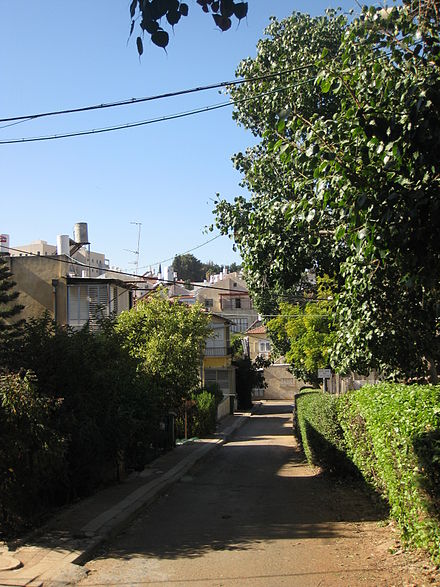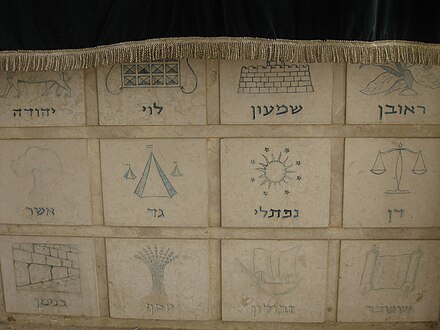Bnei Brak - city in the Tel Aviv District of Israel
Bnei Brak, also spelled Bene Beraq, is an Israeli city. It lies in the Gush Dan district of which Tel Aviv is the largest city, between Ramat Gan and Petach Tikvah.

Get in
- From Ben-Gurion Airport you are best off taking a taxi (price $37). It is possible to take buses, but there is no direct bus from the airport to Bnei Brak, so you would have to change buses in Tel Aviv or Ramat Gan. In that case, you could also take a train from the airport to Tel Aviv HaMerkaz (Central Station) and switch to a bus there.
- From Tel Aviv, take Dan city buses 240 or 160.
- From Jerusalem, take Egged/Dan intercity bus 400 from the Tachanah Merkazit (Central Bus Station), which leaves every 10 to 15 minutes, or take bus 402, which is faster and goes mainly through the chareidi neighborhoods of Jerusalem.
Get around
There are some city bus lines in Bnei Brak.
See
South of Jabotinsky Road, the main traffic artery, is the Haredi area of the city, almost exclusively inhabited by Haredi Jews. Walking in these areas is a unique Israeli experience, but be respectful of the local customs. Wear long-sleeved clothing and full pants; a head cover is also recommended. On Shabbat (Friday night and Saturday), it is not recommended to openly display/use electronic devices, ride a bicycle, or make noise in this area.
- Coca-Cola factory, 32.07815°, 34.84317°. The façade reads "Coca-Cola" in Hebrew. Tours of the facility are offered by reservation; they are interesting to kids, but minimum allowed age is 7 or 8. 2022-12-27
Do
Rabbi Akiva street, running mostly east-west, is the "downtown" of Bnei Brak - the biggest shopping and transportation destination in the city.
Buy

The chareidi population in Israel is generally poorer than the rest of the Jewish population. Therefore the prices are lower, and you can often find better deals on all sorts of domestic items than elsewhere in the greater Tel Aviv area.
The first women-only department store is located in Bnei Brak. For ultra-Orthodox women this a good place to shop since men are not allowed inside the store.
Eat
Bnei Brak is one of the cheapest places in Israel to buy food (both fast food and supermarket goods), but in general the quality is unremarkable. The most interesting food seems to be available on Thursday nights in preparation for Shabbat.
Cholent is the classic Ashkenazi Jewish dish for Shabbat - a stew that's left cooking all night to provide hot food for Shabbat day when cooking is forbidden. In Bnei Brak you can buy cholent before Shabbat to save yourself the trouble of cooking - or better yet, as the local youth do, eat it while chatting with your friends on Thursday night. A number of cholent restaurants operate in Bnei Brak on Thursday nights, you can often spot them by the line heading out the door as people wait to purchase a bowl. Come late, things tend to get busy after 9pm.
- Viznitz bakery, 32.08054°, 34.84071°. Famous for its challah, which they bake and sell on Thursday night in preparation for Shabbat. Their challah is incredibly delicious especially when freshly baked. Even if you're not eating it's still worth visiting to see the variety of types and sizes of challah, smell the aroma of baking, and mingle with the crowds of locals for whom it's a event. The bakery has built up a reputation over the last 70 years. Payment is reportedly cash only, no credit cards.
- Hatzvi bakery, 32.08565°, 34.83542°. Cheap and sells excellent baked goods. It's actually a chain, and this is one of their more central locations. 2022-12-27
Drink
The local population is not in the practice of partying in the secular sense. If you are in town for the festival of Purim, or get invited to a wedding or other festivity, you can expect to have a good time, with separate-sex dancing and the odd l'chaim (toast).
Sleep
There are no hotels in Bnei Brak itself, but there are hotels in surrounding suburbs nearby.
- Judith's Place, 71 Negba Rd, Ramat Gan, +972 50 844 7037. A somewhat dated and expensive apartment: the 'family suite' sleeps 3, with balcony, air conditioning, BBQ facilities, kitchen, laundry, and free wifi. Extra beds available for a fee. 2022-07-08
Learn
 For those interested in Torah studies, there are various yeshivot in Bnei Brak. The Ponevezh Yeshiva, pictured on this page, seems to be the best-known in town.
For those interested in Torah studies, there are various yeshivot in Bnei Brak. The Ponevezh Yeshiva, pictured on this page, seems to be the best-known in town.
Go next
- Jerusalem, particularly its north-central parts, is the other huge concentration of Haredim in Israel.
Bnei Brak
bnei-brak.muni.ilTel Aviv
Primary administrative division